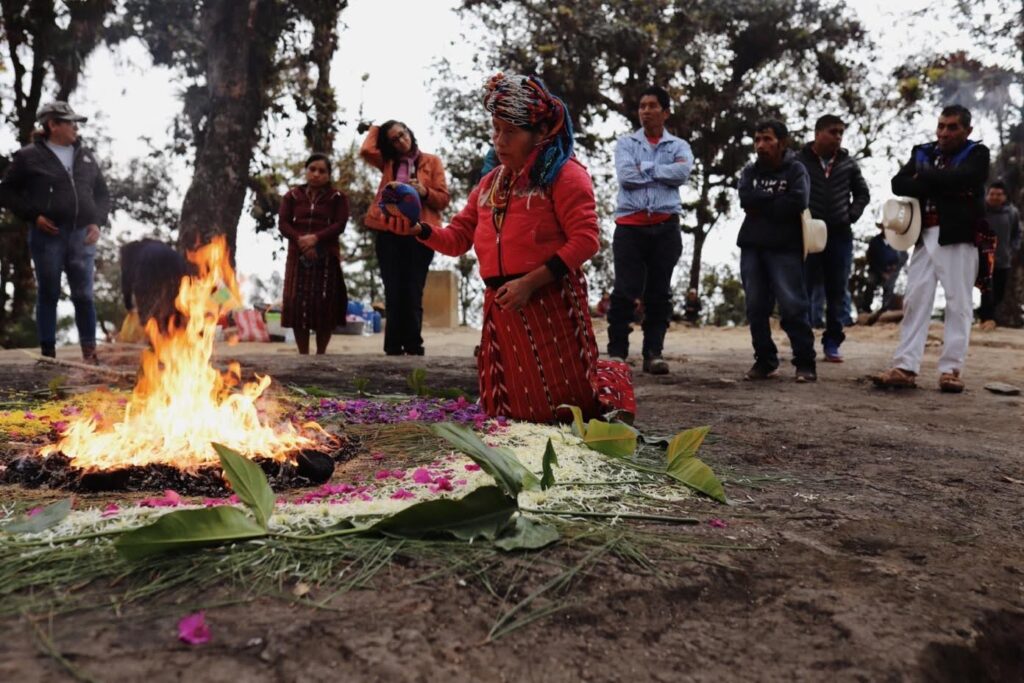Guatemala, 2025
The Dialogues of Knowledge
The early dawn illuminated the empty market hallways in Chichicastenango, Guatemala. This town is one of the strongest bastions of Maya science, where the fervor for Maya spirituality has weathered colonialism, remaining visible in the essence of streets and plazas. The smell of copal incense dominates the air. Today, there is no market. It is Tuesday, a weekly day designated for cleaning. Everyone participates in the cleansing of the market. A water truck leads the way, and the market is cleaned collectively and meticulously coordinated among dozens of vendors, families, and community members wielding brooms. The scene is ordinary and subtle, yet it becomes clear that something different is happening here; communal life thrives in the town. This is a powerful glimpse into the resilience of Maya collective identity and cultural resistance, especially considering colonialism has spent centuries destroying community relations to impose capitalistic modes of living instead.
Guatemala is no stranger to colonial terror and anti-democratic practices. The country has endured decades of American interventionism associated with a series of brutal military dictatorships, culminating in a devastating war of resistance that led to a genocide against the Maya population. In late 2023, mass mobilizations of Maya communities brought the country to a halt, taking over highways and vital infrastructure to compel the government to honor the democratic election of left-wing candidate Bernardo Arevalo. According to Dr. B’eleje Kan, who leads our research team and participated in the resistance, the Maya dialectic method was central in organizing the fight for democracy in those days. Also referred to as the Dialogues of Knowledge, these are formal dialogue circles with simple yet specific protocols designed to establish a genuine and replicable communication format. Dr. Kan explained that people intuitively gathered in dialogue circles in the streets and neighborhoods to strategize local objectives for the resistance and collectively determine the nation’s fate. In retrospect, the Dialogues draw from the same communal life of the town I observed in Chichicastenango—the harnessing of a humanizing sense of unity and ancestral collectivity that has long disappeared from Western societies. This is the energetic dimension of the Dialogues of Knowledge.
The Maya commonly utilize dialogue circles to share experiences, communal healing, exchange perspectives, and organize politically. We aim to document, celebrate, and amplify Maya knowledge respectfully and ethically. Our research team traveled to Guatemala to dialogue with leaders and community members who walk a spiritual path of power: artists, teachers, weavers, lawyers, and activists guiding their life’s vision through the Maya Kosmovision. We are producing an audiovisual dialogue that documents the stories of those dedicated to cultural resistance and political liberation. For instance, we met with hip-hop artists who have mastered the challenge of rapping in their mother tongue, Tz’utujil. We engaged in dialogue with revolutionary teachers from an elementary school that educates children through the lens of the Maya Kosmovision. We also joined a beautiful ceremony atop a sacred mountain, where we spoke with spiritual leaders, social leaders, and community members about their ongoing struggle to protect spiritual sites and secure government support for essential services. We aim to capture wisdom from all these stories in audiovisual format.
For the past two years, we have dedicated our work to exploring the Dialogues of Knowledge and the pedagogical and methodological applications of the Maya Kosmovision. Although the Maya Kosmovision belongs to the Maya people, its content is so rich and comprehensive that it can help anyone connect with their humanity and achieve balance and harmony with their surroundings. The Maya call it el arte del buen vivir, or the art of living well.
— Javier Mateos Campos










